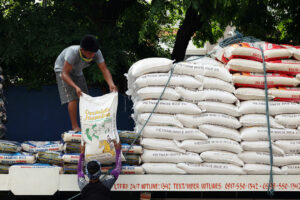PRIVATE companies participating in the P20-per-kilo rice program will absorb the cost of moving inventory from government warehouses to their premises, according to the Department of Agriculture.
The companies in the program will provide the subsidized rice to about 120,000 minimum-wage workers starting June 13, Agriculture spokesman Arnel V. de Mesa said at a briefing. The companies will pick up the rice following notice provided by Food Terminal, Inc. (FTI) of available stock at the nearest National Food Authority (NFA) warehouse.
“The company will go to the nearest NFA (warehouse) to withdraw the rice allocation,” he said.
The company is free to impose any payment scheme on its employees, including salary deduction, but the commodity must be sold at P20 per kilo, Mr. De Mesa said.
The company will then remit the proceeds of the sale to the FTI. The FTI then remit payment to the NFA for the rice stocks it has withdrawn.
The payment setup with the FTI as intermediary was arrived at because the NFA currently lacks the power to sell rice directly to the public.
The revised Rice Tariffication Law of 2024 allows the NFA to sell rice during a declared food emergency, but only to government entities including the FTI and local government units (LGUs).
The P20-per-kilo rice program has been expanded since the pilot launch in Cebu province in May.
With NFA rice priced at P33 per kilo, the FTI and a partner LGU will need to pay P6.50 each in subsidies to close the P13 gap.
For rice sold in state-backed Kadiwa outlets, the FTI absorbs P9 for every kilo of rice sold, Mr. De Mesa noted.
He said 9,487 households or almost 40,000 individuals have already benefitted from the rice program, which features high-quality rice that needs to be cleared out of NFA warehouses because of the age of the inventory.
Mr. De Mesa said the NFA’s rice stocks have hit 400,000 metric tons, enough to sustain the program for the year.
The grains agency is expecting the construction of 36 new warehouses this year. — Kyle Aristophere T. Atienza

